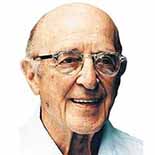 Carl Ransom Rogers (January 8, 1902 – February 4, 1987) was an American psychologist and among the founders of the humanistic approach (and client-centered approach) in psychology. Rogers is widely considered to be one of the founding fathers of psychotherapy research and was honored for his pioneering research with the Award for Distinguished Scientific Contributions by the American Psychological Association (APA) in 1956.
Carl Ransom Rogers (January 8, 1902 – February 4, 1987) was an American psychologist and among the founders of the humanistic approach (and client-centered approach) in psychology. Rogers is widely considered to be one of the founding fathers of psychotherapy research and was honored for his pioneering research with the Award for Distinguished Scientific Contributions by the American Psychological Association (APA) in 1956.
The person-centered approach, his own unique approach to understanding personality and human relationships, found wide application in various domains such as psychotherapy and counseling (client-centered therapy), education (student-centered learning), organizations, and other group settings. For his professional work he was bestowed the Award for Distinguished Professional Contributions to Psychology by the APA in 1972. In a study by Steven J. Haggbloom and colleagues using six criteria such as citations and recognition, Rogers was found to be the sixth most eminent psychologist of the 20th century and second, among clinicians, only to Sigmund Freud. Based on a 1982 survey among 422 respondents of US and Canadian psychologists, he was considered the most influential psychotherapist in history (Sigmund Freud was ranked third).